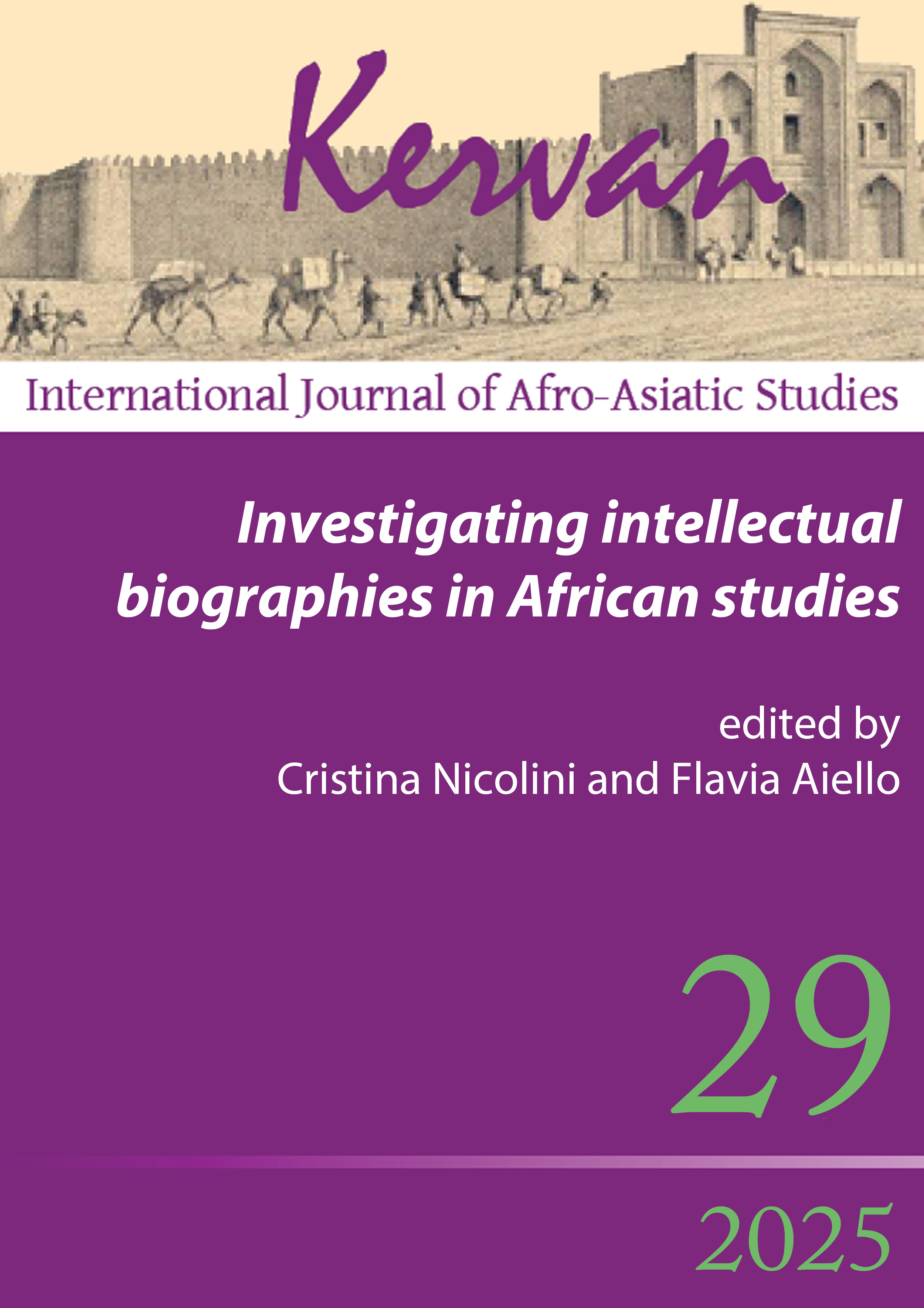Makutano ya lugha Utamaduni na mabadiliko ya kisiasa Tanzania kupitia tawasifu ya Kaluta Amri Abeid (The criss-crossing of language, culture and political change in Tanzania through the autobiography of Kaluta Amri Abeid)
DOI:
https://doi.org/10.13135/1825-263X/11978Abstract
Ikisiri: Kaluta Amri Abedi alikuwa miongoni mwa wahusika muhimu katika maendeleo ya Kiswahili kabla, lakini zaidi, baada ya uhuru. Historia ya lugha ya Kiswahili hasa baada ya uhuru haitaandikwa bila ya kutaja jina la Kaluta Amri Abedi. Majukumu mbalimbali aliyokuwa nayo yanadhihirisha jinsi maisha yake yalivyofungamana na maendeleo na kukua kwa lugha ya Kiswahili. Alikuwa mwanasiasa, msomi na kiongozi wa kidini. Wasifu wake unaonesha makutano ya lugha, utamaduni na mabadiliko ya kisiasa. Ni wasifu unaogusia kwa wakati mmoja changamoto na ushindi wa Kiswahili katika kipindi hiki. Michango ya Abedi ni pamoja na, utetezi wa Kiswahili kama lugha ya taifa, juhudi katika kutafsiri hati za kisheria, kusanifisha lugha ya Kiswahili, na kukuza nafasi yake katika elimu na fasihi. Kujadili wasifu wa maisha yake kunaweza kutoa angalu kidogo, uelewa wa jinsi Kiswahili kilivyobadilika katika mazingira ya kijamii na kisiasa katika Tanzania baada ya uhuru.
Abstract: Kaluta Amri Abedi was a key figure in the development of the post-independence Kiswahili. He played a vital role in shaping the social history of the language and made a significant contribution to both religious and political development in Tanzania.
He was a visionary who played a crucial role in the post-independence development of Kiswahili in Tanzania. His work in promoting the language, literature, and culture has had a lasting impact on the nation, helping to shape its social history and national identity. His work was instrumental in shaping the social, cultural, and linguistic landscape of the country, particularly in the context of nation-building and the establishment of Kiswahili as a unifying national language. He was a politician, a scholar and a religious leader. As a Politician he was part of the broader movement led by the Tanganyika African National Union (TANU), the political party spearheaded by Julius Nyerere. Abedi's political activities were closely tied to the nationalist agenda of uniting Tanzanians across ethnic and regional lines. He was a strong supporter of Julius Nyerere's vision of Ujamaa (African socialism), which emphasized self-reliance, communal living, and equitable distribution of resources. Abedi's political philosophy aligned with Nyerere's emphasis on using Kiswahili as a tool for social cohesion and national development. He believed that language was a key instrument for mobilizing the masses and ensuring that all Tanzanians could participate in the political and economic life of the nation.
Downloads
Downloads
Published
Issue
Section
License
Gli autori che pubblicano su Kervan accettano le seguenti condizioni:
- Gli autori mantengono i diritti sulla loro opera e cedono alla rivista il diritto di prima pubblicazione dell'opera, contemporaneamente licenziata sotto una Licenza Creative Commons - Attribuzione che permette ad altri di condividere l'opera indicando la paternità intellettuale e la prima pubblicazione su questa rivista.
- Gli autori possono aderire ad altri accordi di licenza non esclusiva per la distribuzione della versione dell'opera pubblicata (es. depositarla in un archivio istituzionale o pubblicarla in una monografia), a patto di indicare che la prima pubblicazione è avvenuta su questa rivista.


 The articles that have appeared on Kervan since 2016 are rated as Class A in the system of National Scientific Qualification (ASN, disciplines 10/N1 and 10/N3).
The articles that have appeared on Kervan since 2016 are rated as Class A in the system of National Scientific Qualification (ASN, disciplines 10/N1 and 10/N3). The journal has been approved for inclusion in DOAJ. The DOAJ listing of the journal is available at
The journal has been approved for inclusion in DOAJ. The DOAJ listing of the journal is available at  The journal has been approved for inclusion in ERIH PLUS. The ERIH PLUS listing of the journal is available at
The journal has been approved for inclusion in ERIH PLUS. The ERIH PLUS listing of the journal is available at  Kervan was just accepted for indexing in SCOPUS. This important milestone ensures that articles published in Kervan are easily found when searching for library, archives and Information science and it enables Kervan authors to keep track of how often their article has been cited by others.
Kervan was just accepted for indexing in SCOPUS. This important milestone ensures that articles published in Kervan are easily found when searching for library, archives and Information science and it enables Kervan authors to keep track of how often their article has been cited by others.
